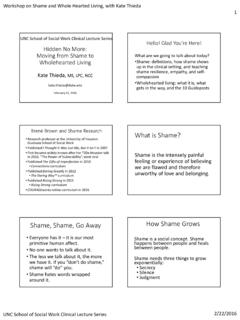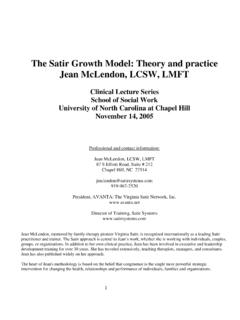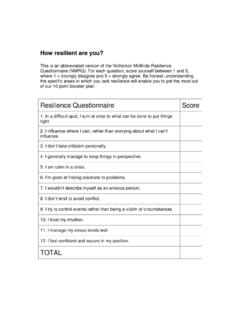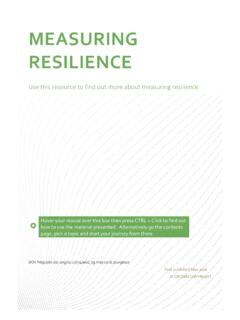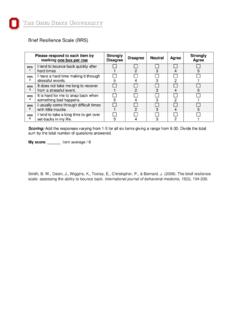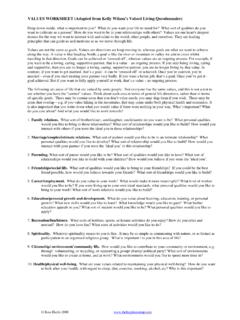Transcription of What’s Your ACE Score? And What’s Your Resilience Score?
1 From : what s your ACE score ? And what s your Resilience score ? There are 10 types of childhood trauma measured in the ACE Study. Five are personal physical abuse, verbal abuse, sexual abuse, physical neglect, and emotional neglect. Five are related to other family members: a parent who s an alcoholic, a mother who s a victim of domestic violence, a family member in jail, a family member diagnosed with a mental illness, and the disappearance of a parent through divorce, death or abandonment. Each type of trauma counts as one. So a person who s been physically abused, with one alcoholic parent, and a mother who was beaten up has an ACE score of three. There are, of course, many other types of childhood trauma watching a sibling being abused, losing a caregiver (grandmother, mother, grandfather, etc.)
2 , homelessness, surviving and recovering from a severe accident, witnessing a father being abused by a mother, witnessing a grandmother abusing a father, etc. The ACE Study included only those 10 childhood traumas because those were mentioned as most common by a group of about 300 Kaiser members; those traumas were also well studied individually in the research literature. The most important thing to remember is that the ACE score is meant as a guideline: If you experienced other types of toxic stress over months or years, then those would likely increase your risk of health consequences. Prior to your 18th birthday: 1. Did a parent or other adult in the household often or very Swear at you, insult you, put you down, or humiliate you?
3 Or Act in a way that made you afraid that you might be physically hurt? No___If Yes, enter 1 __ 2. Did a parent or other adult in the household often or very Push, grab, slap, or throw something at you? or Ever hit you so hard that you had marks or were injured? No___If Yes, enter 1 __ 3. Did an adult or person at least 5 years older than you Touch or fondle you or have you touch their body in a sexual way? or Attempt or actually have oral, anal, or vaginal intercourse with you? No___If Yes, enter 1 __ 4. Did you often or very often feel that .. No one in your family loved you or thought you were important or special? or your family didn t look out for each other, feel close to each other, or support each other?
4 No___If Yes, enter 1 __ 5. Did you often or very often feel that .. You didn t have enough to eat, had to wear dirty clothes, and had no one to protect you? or your parents were too drunk or high to take care of you or take you to the doctor if you needed it? No___If Yes, enter 1 __ 6. Were your parents ever separated or divorced? No___If Yes, enter 1 __ 7. Was your mother or stepmother: Often or very often pushed, grabbed, slapped, or had something thrown at her? or Sometimes, often, or very often kicked, bitten, hit with a fist, or hit with something hard? or Ever repeatedly hit over at least a few minutes or threatened with a gun or knife? No___If Yes, enter 1 __ 8. Did you live with anyone who was a problem drinker or alcoholic, or who used street drugs?
5 No___If Yes, enter 1 __ 9. Was a household member depressed or mentally ill, or did a household member attempt suicide? No___If Yes, enter 1 __ 10. Did a household member go to prison? No___If Yes, enter 1 __ Now add up your Yes answers: _____ This is your ACE score The study s researchers came up with an ACE score to explain a person s risk for chronic disease. Think of it as a cholesterol score for childhood toxic stress. You get one point for each type of trauma. The higher your ACE score , the higher your risk of health and social problems. (Of course, other types of trauma exist that could contribute to an ACE score , so it is conceivable that people could have ACE scores higher than 10; however, the ACE Study measured only 10 types.)
6 As your ACE score increases, so does the risk of disease, social and emotional problems. With an ACE score of 4 or more, things start getting serious. The likelihood of chronic pulmonary lung disease increases 390 percent; hepatitis, 240 percent; depression 460 percent; suicide, 1,220 percent. what s your Resilience score ? This questionnaire was developed by the early childhood service providers, pediatricians, psychologists, and health advocates of Southern Kennebec Healthy Start, Augusta, Maine, in 2006, and updated in February 2013. Two psychologists in the group, Mark Rains and Kate McClinn, came up with the 14 statements with editing suggestions by the other members of the group. The scoring system was modeled after the ACE Study questions.
7 The content of the questions was based on a number of research studies from the literature over the past 40 years including that of Emmy Werner and others. Its purpose is limited to parenting education. It was not developed for research. Resilience questionnaire Please circle the most accurate answer under each statement: 1. I believe that my mother loved me when I was little. Definitely true Probably true Not sure Probably Not True Definitely Not True 2. I believe that my father loved me when I was little. Definitely true Probably true Not sure Probably Not True Definitely Not True 3. When I was little, other people helped my mother and father take care of me and they seemed to love me.
8 Definitely true Probably true Not sure Probably Not True Definitely Not True 4. I ve heard that when I was an infant someone in my family enjoyed playing with me, and I enjoyed it, too. Definitely true Probably true Not sure Probably Not True Definitely Not True 5. When I was a child, there were relatives in my family who made me feel better if I was sad or worried. Definitely true Probably true Not sure Probably Not True Definitely Not True 6. When I was a child, neighbors or my friends parents seemed to like me. Definitely true Probably true Not sure Probably Not True Definitely Not True 7.
9 When I was a child, teachers, coaches, youth leaders or ministers were there to help me. Definitely true Probably true Not sure Probably Not True Definitely Not True 8. Someone in my family cared about how I was doing in school. Definitely true Probably true Not sure Probably Not True Definitely Not True 9. My family, neighbors and friends talked often about making our lives better. Definitely true Probably true Not sure Probably Not True Definitely Not True 10. We had rules in our house and were expected to keep them. Definitely true Probably true Not sure Probably Not True Definitely Not True 11.
10 When I felt really bad, I could almost always find someone I trusted to talk to. Definitely true Probably true Not sure Probably Not True Definitely Not True 12. As a youth, people noticed that I was capable and could get things done. Definitely true Probably true Not sure Probably Not True Definitely Not True 13. I was independent and a go-getter. Definitely true Probably true Not sure Probably Not True Definitely Not True 14. I believed that life is what you make it. Definitely true Probably true Not sure Probably Not True Definitely Not True How many of these 14 protective factors did I have as a child and youth?

